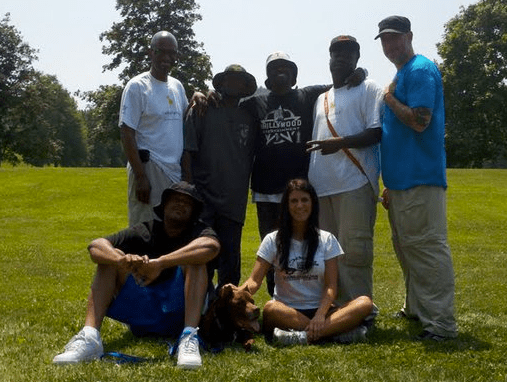One of my Facebook friends is a 17-year-old Pit Bull named Sarge. (I don’t have many animal “friends” — at least not on Facebook — but I made an exception for Sarge. A senior dog and a bully breed ambassador with a human family committed to animal welfare, how could I resist?)
For the first 14 years of his life, Sarge endured ongoing abuse at the home of an alleged dog fighter, and he will always bear external scars from that cruelty. On the inside, however, Sarge is one of the most healthy, well-adjusted, loving individuals you could ever know. In fact last week, he posted a photo of himself posing with a group of men who speak on behalf of HSUS’s End Dog Fighting campaign. A group of men who were once active dog fighters themselves.
By their own admission, the men did terrible things in their former lives, and the animals they fought suffered horribly. It’s difficult to read even vague accounts of what went on. Yet I found myself wishing colossal success to these unlikely advocates, not just in their anti-dogfighting efforts, but on a personal and professional level as well.
So why is it so easy for me to forgive people like Sean Moore and Anthony Pickett and not others who participated in similar acts?
Unlike other notorious dog fighters, Moore’s and Pickett’s struggle for redemption isn’t measured and tracked by the general public. These guys aren’t professional football players looking to resurrect a career or land endorsements or appear sincere when the camera’s on. They are simply doing the right thing — a brave, selfless, noble thing — after having been involved in something heinous.
This is redemption.
My friend Sarge’s post last week coincided with a visit to Capitol Hill by a different group of HSUS representatives. Michael Vick and HSUS President Wayne Pacelle each spoke briefly in support of a bill that would criminalize bringing minors to animal fighting events. (I know — that there aren’t already all kinds of laws prohibiting this stuff is frightening and unbelievable.)
While I personally wasn’t moved by Vick’s testimonial nor did I recognize any passion or authenticity in his statement, I acknowledge that I’m not the target audience. I also acknowledge it’s not realistic to think that guys like Moore and Pickett can reach as many people as Vick does — or simply generate as much publicity when they speak. So I ask myself, does it matter who delivers the message, as long as it’s the right one?
As Sarge said, “Dogs are simple. We don’t overthink things, we just want results. If someone gives me a treat I don’t spit it out because I’m not sure what their reason was, or I’d be missing out on treats! So when people — whether it’s these guys or Michael Vick himself — are doing things that’ll produce results for dogs like me, I don’t waste time questioning their motives; I just find more opportunities to put them to work!”
Sarge has a point. If one kid turns away from dog fighting because he heard Michael Vick say “Just don’t do it,” then that’s a good thing. That doesn’t make Vick worthy of respect, doesn’t imply he’s a decent man. (It’s absurd to define heroes by their talent rather than their deeds.) But maybe it means that like athletic wear companies and supplement makers, the animal welfare movement, too, can benefit when we use him to sell our message. Hero, no. Salesman, yes?
Or does somehow allowing Vick the privilege of delivering such a message imbue a certain esteem?
I’m not sure. What I do know is that Vick won’t be selling me my running shoes or my energy supplements. When it comes, however, to anti-dog fighting education, can I support the message while silently loathing the messenger? If it means that ultimately fewer dogs are harmed, I’ll take a tip from my Facebook friend. Eliminating violence, cruelty, and suffering is the goal above all. Even if a public image is whitewashed in the process.
It’s not fair, but I’m pretty sure Sarge would want it that way. And what Sarge wants, I want.









